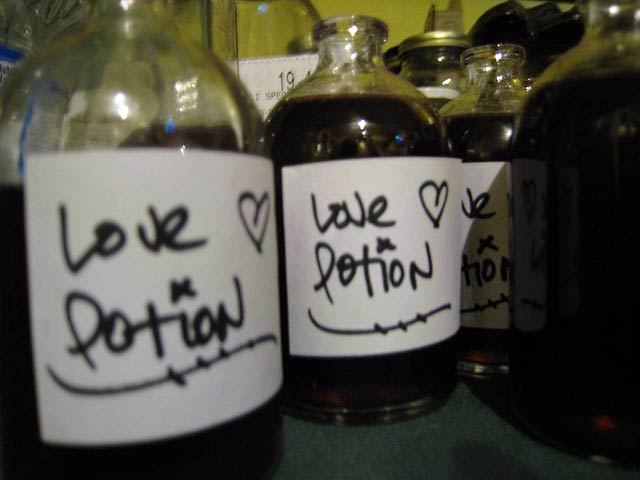
Has your love life lost its spark? Too tired after long days at work? Or maybe you suspect your partner’s eye has been wandering?
Zainab Usman, a Muslim from northern Nigeria, says she has the solution for all these problems. Walking through a room lined with jars, bottles and gourds, perfumed air trailing in her wake, she ticks off each remedy on delicately manicured fingers. Out come a stream of names that sound like a cross between children’s sweets and street slang for class A drugs.
There is the “wonder wand”, a vial of peppercorn-sized pills that promise to enhance intimate experiences. Zuman mata, which translates as “woman’s honey” in northern Nigeria’s Hausa language, is guaranteed to “keep a man coming back”. Or how about tsumi, a herb and camel’s milk concoction that Usman has nicknamed “cocaine” which, if its effects match up to the claims, is best taken only if the user has several days spare to recover?
This is the world of kayan mata (“women’s things”), a five-century-old practice in northern Nigeria and neighbouring Niger aimed at keeping married couples’ love lives lubricated, so to speak. Handed down the generations by women, the creams, scrubs, perfumes and tablets are made using local herbs and roots that grow in the arid north. Traditionally meant to prepare a bride for marriage and ensure social stability by keeping couples happily married, they are growing in popularity.
Men have their own version, called maganin maza (“men’s potions”), which includes chilli-infused foods.
Neither country particularly needs a helping hand in the sex department: 11 000 babies are born every day in Nigeria, the world’s eighth most populous country, while Niger has the world’s highest birth rate. But the centuries-old kayan mata is one of the few times when sex is openly discussed amid an otherwise decidedly old-fashioned approach to discussing physical intimacy and its consequences.
“In the north, girls start learning about it at a very young age,” said Usman, whose female in-laws presented her with a kayan matagift box on the eve of her wedding. It accompanied the equally traditional gara – a gift of kitchen utensils as the couple started a new home.
“The south is a good market for me because it’s still new here, although I’m not sure Lagosians are ready for this,” says Usman, who has started selling her wares in Lagos, hundreds of miles south of her home city of Sokoto.
As two giggling friends visit Usman, a third hovers disapprovingly nearby, though not so far as to be out of earshot.
“Do you have ones that uplift breasts?” the first friend asks.
“Of course,” replies Usman, pouring a thick liquid into a tiny jar. For good measure, she adds a green powder called danagadas (“the one from Agadez” – a city in Niger’s Sahara desert). “I can’t use this one very much, I’d be too tired,” she adds.
What happens, one of the women wants to know, if you stop taking the herbs?
“Your husband will notice a massive difference straight away,” Usman says, snapping her fingers. The two friends look at each other and fall about laughing.
“You guys are making me feel uncomfortable,” Usman says, a hint of reproach in her voice. “I’m trying to help you. It’s not a big deal – women have been using this for ages.”
The ingredients of kayan mata have changed little over 500 years except, perhaps, that dried camel’s milk is now preferred to fresh as the goods travel longer distances. Typically, products have a base of rice, honey, millet and tiger nuts. Fish sperm and manatee fat are sometimes thrown in. Key, though, are the roots of the desert-growing jujube, baobab and catchthorn trees, which have long been used medicinally across the Sahara. Some herbs are so localised English translations are hard to come by.
“There’s no reason to suppose that there’s not some interesting ethnopharmacology behind the use of these remedies,” says James Moffatt, a senior lecturer at St George’s hospital, University of London.
Nevertheless some may be placebos similar to the western perception that oysters are aphrodisiacs, he says. “If dim lights, mood music and a plate of molluscs do it for one culture, why not camel milk and dates for another?”
Business is certainly booming. Big-name dealers include one of the wives of former president Ibrahim Babangida.
In the labyrinthine streets of Wuse market in the capital Abuja, Umar Mohammed, 56, sits in his booth surrounded by imitation gold jewellery, intriguingly named fake perfumes, sequinned headscarves and incense burners.
But at a word from two visiting customers, he springs into life and throws open a cupboard full of the familiar vials and powders. “Why didn’t you say [what you wanted] right away?” after two elderly women in hijabs spend 15 minutes apparently poring over a single stick of incense.
He tries to sell them a dust-covered box of products whose extraordinary price is justified, he says, as it came from Malaysia. “When a woman uses these products, she will look and smell like a flower, which is how it should be.”
